
ACTA SCIENTIARUM-TECHNOLOGY
Scope & Guideline
Catalyzing Interdisciplinary Discoveries
Introduction
Aims and Scopes
- Applied Research in Environmental Science:
The journal publishes studies that explore environmental issues, including waste management, pollution control, and sustainable practices, highlighting technological advancements in these areas. - Innovations in Agriculture and Food Technology:
Research on agricultural practices, food preservation, and processing techniques is a core focus, emphasizing the development of novel methods to enhance food quality and safety. - Advancements in Material Science and Engineering:
Papers often feature new materials, their synthesis, characterization, and applications, particularly in construction, packaging, and biomedical fields. - Computational and Statistical Modeling:
The journal embraces methodologies involving computational techniques and statistical modeling to analyze complex systems, particularly in engineering and environmental studies. - Health and Biomedical Research:
Studies related to health sciences, including the development of health technologies, bioproducts, and food science, are prevalent, showcasing interdisciplinary approaches. - Renewable Energy and Sustainability:
Research on renewable energy sources, energy efficiency, and sustainable technologies is increasingly emphasized, reflecting global trends towards sustainability.
Trending and Emerging
- Smart Technologies and IoT Applications:
An increasing number of papers focus on the integration of Internet of Things (IoT) technologies in various fields, including agriculture, environmental monitoring, and smart cities. - Sustainable Practices in Agriculture:
There is a growing emphasis on sustainable agricultural practices, including bioproducts and eco-friendly pest control methods, reflecting global concerns about food security and environmental impact. - Advanced Material Development:
Research on novel materials, particularly those that are biodegradable or have enhanced properties for specific applications, is on the rise, driven by the need for sustainable solutions. - Machine Learning and Data Analysis:
The application of machine learning techniques in various domains, from healthcare to environmental science, is increasingly prevalent, showcasing the journal's alignment with technological advancements. - Climate Change Mitigation Strategies:
Research addressing the impacts of climate change and proposing mitigation strategies, particularly in water management and energy efficiency, is gaining traction, indicating the journal's commitment to relevant societal challenges.
Declining or Waning
- Traditional Engineering Practices:
Research focusing solely on conventional engineering practices appears to be declining as the journal shifts towards more interdisciplinary and technology-driven approaches. - Basic Theoretical Studies:
There is a noticeable decrease in purely theoretical studies without practical applications, as the journal prioritizes innovative and applied research that can demonstrate real-world impact. - Non-Environmental Health Topics:
Topics unrelated to environmental health, such as certain niche medical studies, are less frequently published, reflecting a trend towards integrating health with environmental sustainability.
Similar Journals
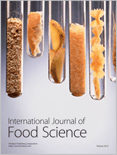
International Journal of Food Science
Fostering Collaboration in Food Science ResearchThe International Journal of Food Science, published by HINDAWI LTD, stands as a crucial platform for advancing knowledge within the realm of food science. Established in 2013, this Open Access journal based in Egypt has garnered significant recognition, achieving an impressive Q2 classification in the 2023 Food Science category, which reflects its commitment to quality and impactful research. With a Scopus rank of #88 out of 389 in Agricultural and Biological Sciences and placing in the 77th percentile, this journal serves as an essential resource for researchers, professionals, and students dedicated to innovative developments and scientific exploration in food science. The journal not only provides unrestricted access to valuable research but also aims to foster collaboration and dissemination of knowledge on critical issues affecting food safety, nutrition, and technology. For those looking to keep abreast of the latest advancements, the International Journal of Food Science is certainly an indispensable addition to their academic pursuits.
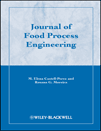
JOURNAL OF FOOD PROCESS ENGINEERING
Transforming food processing with cutting-edge research.JOURNAL OF FOOD PROCESS ENGINEERING, published by WILEY, is a prestigious academic journal dedicated to advancing the field of food processing through innovative engineering research and practical applications. With an ISSN of 0145-8876 and an E-ISSN of 1745-4530, this journal serves as a crucial platform for researchers and professionals focusing on the intersection of chemical engineering and food science. Operating in the United States and established in 1977, it has gained a reputation for its rigorous peer-review process and high-quality publications, reflected in its Category Quartiles of Q2 in both Chemical Engineering (miscellaneous) and Food Science for 2023. The journal is also well-positioned within the Scopus rankings, holding the 104th spot out of 389 in Agricultural and Biological Sciences and the 82nd in General Chemical Engineering. While it currently does not offer Open Access options, the JOURNAL OF FOOD PROCESS ENGINEERING remains an indispensable resource for those looking to explore critical studies and developments that shape food processing technologies by the year 2024 and beyond.
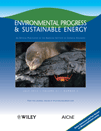
Environmental Progress & Sustainable Energy
Transforming environmental challenges into opportunities.Environmental Progress & Sustainable Energy, published by WILEY, is an influential journal dedicated to the crucial fields of environmental science and sustainable energy. Since its inception in 2009, this journal has consistently aimed to advance knowledge and understanding of innovative approaches and technologies that promote sustainability across various sectors. With an impact factor reflective of its strong academic contributions, the journal is catapulted into Q2 and Q3 quartiles across multiple categories, including Chemical Engineering and Environmental Science, demonstrating its central role in the dialogue surrounding pressing environmental issues. Researchers and professionals can access its cutting-edge studies through both traditional and open access options, facilitating the dissemination of knowledge globally. Addressed to an array of stakeholders from academia and industry alike, Environmental Progress & Sustainable Energy is not only a repository of research but also a platform for transformative ideas that aim to pave the way for a more sustainable future, making it an essential resource for those committed to the interplay of environmental stewardship and energy innovation.

LATIN AMERICAN APPLIED RESEARCH
Empowering Researchers Through Collaboration and InnovationLATIN AMERICAN APPLIED RESEARCH is a distinguished academic journal published by PLAPIQUI (UNS-CONICET), dedicated to advancing the fields of Chemical Engineering, Chemistry, and Mechanical Engineering. Since its inception in 1996, this journal has become a valuable platform for researchers and professionals to disseminate innovative findings and technological advancements within the region and beyond. With an ISSN of 0327-0793 and an E-ISSN of 1851-8796, it contributes to the global scientific community by publishing high-quality research that addresses contemporary challenges. Despite currently being classified in the Q3 and Q4 quartiles within its respective categories in 2023, LATIN AMERICAN APPLIED RESEARCH is committed to enhancing its impact, as shown through its rigorous peer-review process and the scope of topics it covers. Utilizing a user-friendly access model, this journal is instrumental for students and professionals seeking to stay abreast of the latest innovations in applied research. Positioned in Bahía Blanca, Argentina, it serves as a critical academic resource that fosters collaboration and dialogue among scholars and industry experts across Latin America.

Sigma Journal of Engineering and Natural Sciences-Sigma Muhendislik ve Fen Bilimleri Dergisi
Driving Progress in Energy and Engineering ChallengesSigma Journal of Engineering and Natural Sciences (Sigma Mühendislik ve Fen Bilimleri Dergisi) is a distinguished open-access journal published by Yıldız Technical University in Turkey since 2004. With an emphasis on the interdisciplinary fields of engineering and natural sciences, this journal caters to researchers, professionals, and students seeking to share innovative research and developments. Although currently positioned in the Q4 quartile across several categories including Computational Mechanics and Mechanics of Materials, Sigma is committed to enhancing its scientific impact and accessibility. The journal invites contributions that enrich knowledge in areas of energy and engineering, addressing complex challenges with a regional and global perspective. Researchers can freely access and disseminate their findings, fostering collaborative advancements in the community. By continually striving for excellence, Sigma Journal serves as a crucial platform for scholarly discourse and innovative research in engineering and natural sciences.

Applications in Engineering Science
Exploring the Future of Engineering ApplicationsApplications in Engineering Science is an innovative and highly-regarded open-access journal, published by ELSEVIER in the United Kingdom, focusing on the cross-disciplinary fields of Civil and Structural Engineering, Computational Mechanics, and Mechanical Engineering. Since its inception in 2020, the journal has rapidly established a solid reputation, landing in the Q2 quartile category across multiple engineering disciplines, reflecting its commitment to quality and relevance in the rapidly evolving engineering landscape. With Scopus rankings placing it prominently in the 66th percentile for Computational Mechanics and 58th for Mechanical Engineering, it serves as a vital platform for researchers, professionals, and students alike to share advanced methodologies, innovative applications, and interdisciplinary insights. The journal is committed to fostering open access to cutting-edge research, empowering readers worldwide to stay abreast of significant technological advancements and practical applications in engineering science.
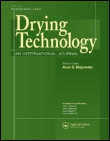
DRYING TECHNOLOGY
Unveiling the Potential of Drying Technologies WorldwideDRYING TECHNOLOGY is a premier journal dedicated to the dissemination of cutting-edge research and advancements in the field of drying processes across various industries, including chemical engineering and physical chemistry. Published by Taylor & Francis Inc, this journal has established itself as a key resource with an impressive impact, indicated by its Q2 quartile ranking in both the Chemical Engineering (miscellaneous) and Physical and Theoretical Chemistry categories. The journal’s extensive coverage since its inception in 1983 offers a comprehensive perspective on theoretical and applied research related to drying technologies, with a strong focus on innovation and practical applications. Researchers, professionals, and students alike can access a wealth of knowledge that enhances their understanding and fosters collaboration within this vital scientific discipline. Although not openly accessible, DRYING TECHNOLOGY remains an essential reference for those engaged in related fields, particularly within the United States and globally.
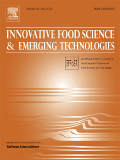
Innovative Food Science & Emerging Technologies
Advancing the Future of Food Science and TechnologyWelcome to Innovative Food Science & Emerging Technologies, a premier journal published by ELSEVIER SCI LTD that serves as a vital platform for researchers and professionals dedicated to the rapidly evolving field of food science. With an impressive Impact Factor and a position in the Q1 category across notable disciplines including Chemistry, Food Science, and Industrial and Manufacturing Engineering, this journal ranks among the top tier within its fields, evidenced by its Scopus ranking of 20th out of 389 in Food Science, placing it in the 94th percentile. Our readers can expect to encounter cutting-edge research and innovative applications from 2000 through 2024, exploring critical themes that contribute to advancements in food technology, manufacturing processes, and sustainability practices. Although currently not an Open Access publication, we maintain a commitment to disseminating high-quality scholarship that enhances knowledge and encourages collaboration among a diverse audience. Join us in driving forward the forefront of food science research in the Netherlands and beyond.

Iran-Journal of the British Institute of Persian Studies
Exploring the richness of Iranian culture.Iran-Journal of the British Institute of Persian Studies, published by Routledge Journals, Taylor & Francis Ltd, is a premier academic journal dedicated to advancing the fields of Anthropology, Arts and Humanities, and Cultural Studies. With an ISSN of 0578-6967 and an E-ISSN of 2396-9202, this journal plays a pivotal role in fostering scholarly discourse and research on Persian studies and the broader Iranian context. Branded with a commendable Q2 category ranking in 2023, it positions itself within the top quartile of its field, making it an essential resource for researchers, professionals, and students alike. While currently not available as an open access journal, its relevance is underscored further by its solid standings in Scopus rankings, where it holds the 25th position in General Arts and Humanities and ranks within the top 20% of Cultural Studies. The journal, actively publishing quality research from 2011 onwards, serves as a vital platform for disseminating innovative ideas and findings that contribute to a deeper understanding of Iranian culture and society.

Pertanika Journal of Science and Technology
Unveiling cutting-edge studies for a sustainable future.Pertanika Journal of Science and Technology, published by UNIV PUTRA MALAYSIA PRESS, stands as a significant platform in the fields of Agricultural and Biological Sciences, Chemical Engineering, Computer Science, and Environmental Science. With an ISSN of 0128-7680, this esteemed journal aims to foster high-quality research and knowledge sharing by presenting novel studies and advancements from 2010 onwards, with expectations of convergence until 2024. Recognized as a Q3 journal in multiple categories, including miscellaneous fields of the aforementioned domains, it offers a valuable resource for researchers, students, and industry professionals seeking to push the boundaries of science and technology. Though access options are currently limited, the journal's commitment to disseminating essential findings contributes to its credibility and relevance in the academic community, making it an essential read for those invested in cutting-edge scientific research and development. Based in Serdang, Selangor, Malaysia, the journal not only caters to a global audience but also emphasizes the significance of local research advancements in a broader context.